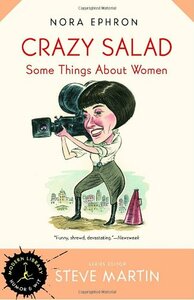You need to sign in or sign up before continuing.
Take a photo of a barcode or cover
I was inspired to read this by Ariel Levy's recent New Yorker profile on Ephron. This has much more substance than her movies, or even her most recent book. Most of these essays were written just after I was born, so it's a useful historical perspective. A lot actually has improved. My copy is full of little post-it flags for things I will have to look up, or ask my mother about. On the other hand, probably none of the book's original readers knew why a Pillsbury Bake-Off contestant's speedy Hawaiian bread was called Wiki Coffee Cake....
funny
informative
lighthearted
fast-paced
Ugh. I was really enjoying this until the last essay was so unbearably transphobic. Different time and whatnot, but I don't care. I don't want to read that shit.
Other than that shit, I found a lot of these essays fascinating. I kept having to look up terms and people, because while they were known to people in the 1970's, fifty years later I haven't heard of the first woman to umpire for professional baseball. I didn't know someone before Billie Jean King played a "battle of the sexes" tennis match. I've never heard of Richard Nixon's secretary. It was really interesting to read about these events that were so relevant at the time. Definitely makes me curious what that will look like in the future.
Other than that shit, I found a lot of these essays fascinating. I kept having to look up terms and people, because while they were known to people in the 1970's, fifty years later I haven't heard of the first woman to umpire for professional baseball. I didn't know someone before Billie Jean King played a "battle of the sexes" tennis match. I've never heard of Richard Nixon's secretary. It was really interesting to read about these events that were so relevant at the time. Definitely makes me curious what that will look like in the future.
Graphic: Transphobia
Megan Daum recommended Crazy Salad when I saw her speak at Butler as part of their Visiting Writers Series last month. Ephron's influence on Daum's writing is evident. A good thing! Love their ears and eyes for social irony, and their habit of wrapping up essays with a tough question or a jewel of wisdom.
Learning about Ephron's work as a feminist activist and thinker give me a new appreciation for Sleepness in Seattle and You've Got Mail. Her passing is such a loss. We could really use her wit and sense of humor to make sense of these interesting times...
Learning about Ephron's work as a feminist activist and thinker give me a new appreciation for Sleepness in Seattle and You've Got Mail. Her passing is such a loss. We could really use her wit and sense of humor to make sense of these interesting times...
funny
informative
slow-paced
It’s not really something that holds up well in 2020, I’ll leave it at that.
I’ll be honest, I don’t think I would’ve read this - at least, I wouldn’t have made it the first Nora Ephron book I read - if I’d known it was just a collection of her articles, and quite a mish-mashed one at that (a book review here, op-ed there, investigative journalism, miniature biography, you name it…) But since it was in my queue, I went ahead anyway. As the title suggests, the articles aren’t without a common theme, but the quality and relevance varies wildly.
The highlight for me was the one about feminine hygiene spray - a still highly relevant look at how companies create need for a possibly unnecessary product as part of their marketing. I found the ones about the women in Nixon’s life - his daughter and secretary - very interesting too. What I’ll also say is it became clear to me how much we could use a voice like Ephron’s again today as we come more and more dangerously close to absolutist thinking, especially when it comes to things like feminism. What I mean by that is neatly encapsulated in this paragraph from the article titled “Truth and Consequences”:
“The problem, I’m afraid, is that as a writer my commitment is to something that, God help me, I think of as The Truth, and as a feminist my commitment is to the women’s movement. And ever since I became loosely involved with it, it has seemed to me one of the recurring ironies of this movement that there is no way to tell the truth about it without, in some small way, seeming to hurt it.”
This slight ambivalence feeds into most of Ephron’s writing here, and I expect it’s why I’ve increasingly come to admire the movies that ultimately (with Julie and Julia, and her blu-ray commentary on that movie) led me to want to read her earlier prose. This mightn’t have been the best start on that, but It (even the last, most awkwardly dated, chapter about a trans woman) certainly didn’t put me off reading the rest of her work.
The highlight for me was the one about feminine hygiene spray - a still highly relevant look at how companies create need for a possibly unnecessary product as part of their marketing. I found the ones about the women in Nixon’s life - his daughter and secretary - very interesting too. What I’ll also say is it became clear to me how much we could use a voice like Ephron’s again today as we come more and more dangerously close to absolutist thinking, especially when it comes to things like feminism. What I mean by that is neatly encapsulated in this paragraph from the article titled “Truth and Consequences”:
“The problem, I’m afraid, is that as a writer my commitment is to something that, God help me, I think of as The Truth, and as a feminist my commitment is to the women’s movement. And ever since I became loosely involved with it, it has seemed to me one of the recurring ironies of this movement that there is no way to tell the truth about it without, in some small way, seeming to hurt it.”
This slight ambivalence feeds into most of Ephron’s writing here, and I expect it’s why I’ve increasingly come to admire the movies that ultimately (with Julie and Julia, and her blu-ray commentary on that movie) led me to want to read her earlier prose. This mightn’t have been the best start on that, but It (even the last, most awkwardly dated, chapter about a trans woman) certainly didn’t put me off reading the rest of her work.
Compilation of previously printed short stories. Some are timeless and others are quite dated, however all still very good if you can slog through some of them. As far as the dated ones are concerned, it's interesting to see how people thought during those periods. Because of the age difference between myself and the author, it's quite easy to take things for granted that other people "fought" for.
Nora Ephron's contemporaneous review of the second-wave feminist movement is interesting in some ways and dated in others. Punctuated by occasional flashes of brilliance that appear much more consistently in her later work, I found this a compelling read mainly insofar as it provides a milestone in Ephron's writing career, and Nora Ephron is a writer I have come to care increasingly about since I read her other works ('I Hate My Neck' and 'Heartburn' especially).
First, the datedness: I will confess to not care very much about feuds in the second-wave feminist movement. I have maybe a faint idea of who Betty Friedan was, and who the other one was, so why they fought and who was to blame is just not that interesting to me, though I have no doubt it was compelling at the time. The same goes to her (at the time) controversial evisceration of her alma mater Wellesley, which she described as having "turned out a generation of docile and unadventurous women". I'm sure the subject must have been very fascinating to some people deeper into the millieu. But: I didn't care.
More seriously, there is an entire essay that is transphobic and gross so... this is a very strong reason to not read the collection. I'm putting this under 'datedness', because do I think second-wave feminism was deeply troubling for a whole host of reasons, including the trans-exclusionary ideology that was very common amongst its proponents? Yes. Do I think transphobia and claims about 'real womanhood' (adjacent to, eyeroll, 'universal womanhood') exist in contemporary social discourse and are people hurt by it now? Definitely!!! Either way, it's a cruel, cutting little essay and in this instance Ephron is certainly punching down rather than up for her beloved copy.
The strengths: I thought that Ephron is at her joyous best when she digs into human follity. You saw it a little in her essays about Friedan and whoever else (I can't decide if it's my bad memory, or the forgettableness of the whole thing, that makes me not be able to remember), but again those did tend to lapse into 'and then X said' and 'Y did that'. Capitalising on those strengths, I liked: the essays about consciousness-raising, being a journalist versus a feminist, the piece about The Palm Beach Social, and Upstairs, Downstairs. And of course, because I've always said Ephron is at her best when she lets the pain wink through, the piece about her mother's mink.
First, the datedness: I will confess to not care very much about feuds in the second-wave feminist movement. I have maybe a faint idea of who Betty Friedan was, and who the other one was, so why they fought and who was to blame is just not that interesting to me, though I have no doubt it was compelling at the time. The same goes to her (at the time) controversial evisceration of her alma mater Wellesley, which she described as having "turned out a generation of docile and unadventurous women". I'm sure the subject must have been very fascinating to some people deeper into the millieu. But: I didn't care.
More seriously, there is an entire essay that is transphobic and gross so... this is a very strong reason to not read the collection. I'm putting this under 'datedness', because do I think second-wave feminism was deeply troubling for a whole host of reasons, including the trans-exclusionary ideology that was very common amongst its proponents? Yes. Do I think transphobia and claims about 'real womanhood' (adjacent to, eyeroll, 'universal womanhood') exist in contemporary social discourse and are people hurt by it now? Definitely!!! Either way, it's a cruel, cutting little essay and in this instance Ephron is certainly punching down rather than up for her beloved copy.
The strengths: I thought that Ephron is at her joyous best when she digs into human follity. You saw it a little in her essays about Friedan and whoever else (I can't decide if it's my bad memory, or the forgettableness of the whole thing, that makes me not be able to remember), but again those did tend to lapse into 'and then X said' and 'Y did that'. Capitalising on those strengths, I liked: the essays about consciousness-raising, being a journalist versus a feminist, the piece about The Palm Beach Social, and Upstairs, Downstairs. And of course, because I've always said Ephron is at her best when she lets the pain wink through, the piece about her mother's mink.




